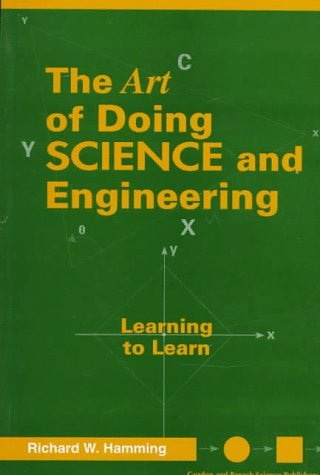Learning how to learn
Some notes, learnings and thoughts from the book "The Art of doing Science and Engineering"'s first chapter.
We started Smort.in after noticing that many teenagers are no longer excited about engineering, space, and tech news. It seems like the enthusiasm for science in India is fading, but we're here to help reignite it!
I’m currently wrapping up my first year of college. Lately, I’ve seen a lot of my friends hanging out all night, doing very little. Just yesterday, bored out of my mind, I went online, downloaded “The Art of Doing Science and Engineering,” and read the first few chapters for three straight hours. My only thought afterward was, "This is freaking amazing." I knew I had to apply what I learned.
So, today’s post is going to be a bit different. I want to share some notes and insights from my reading that really sparked my curiosity. It's all about mastering the art of science and engineering and learning how to learn.
Predicting future is hard.
As a good engineer, how do you know what will work and what will not? How do you know if a technology of yours will diffuse into society? Past can be a good guide, but not always. Here’s a small snippet from the book that was helpful -
In science if you know what you are doing you should not be doing it.
In engineering if you do not know what you are doing you should not be doing it.
So, how do you make good predictions? How do you make sure you’re working on something worthwhile? Just ask these three questions!
What is possible? (science)
What is likely to happen? (engineering)
What is desirable to have happen? (societal factors)
Usually, something that hits all three of these is what I call a “revolutionary” technology.
If second differs from third, it can be mended to satisfy the third question, hence making it revolutionary.
Maybe this is why crypto, VR, etc technologies are still lagging behind? Maybe crypto and VR are possible but less desirable to go fully mainstream? If so, how can we “mend” these technologies in a way that they are more desirable for our society?
How do you get good at learning?
By learning the fundamentals of anything. As discussed earlier, half life of any knowledge is about 15-17 years, after which there is enough new stuff that the knowledge is considered obsolete. Our world is evolving really quickly and a lot of changes happen every single year.
In this fast moving world, the only way to keep up is to ace the fundamentals very, very well, and be able to start from 0 on any topic in that field and still being able to pick it up.
This is probably why computer systems engineers seem to always be really good at their craft, sometimes even better than average computer scientists! Because Systems engineering teaches them everything in the lowest level- the fundamentals of how computers work. This means learning systems engineering - bits and bytes and memory and CPU design might not be very cool to learn and very boring stuff, but that's the only information that's likely to remain constant in this rapidly evolving world.
Vision is the #1 decider for your success.
Richard Hamming included this amazing example in his book:
Imagine a drunken sailor who staggers from left to right with n independant random steps. The soldier will always, on average, end up sqrt(n) steps from the origin. But if there is a pretty girl in one direction, the sailors steps will tend to go in that direction and he will go a total distance that is proportional to n.
In a lifetime of many, many independent choices, small and large, a career with a vision will get you a distance proportional to n, while no vision will get you only the distance sqrt(n). In a sense, the main difference between those who go far and those who do not is some people have a vision and the others do not and therefore can only react to the current events as they happen.
So, the main task for your teenage years is to define, in detail, your vision of the future. (and smort will help you do that xD)
Conclusion
To conclude, I’ll ask you this simple question:
Should we model our predictions on the past? If yes, what would be a better assumption?
humanity was made to progress, it happened linearly and naturally, it was supposed to be like that
some humans came along and became inflection points (newton, pythagoras, alexander the great, hitler, plato, aristotle and countless others... maybe even you and me in the future?)
first belief makes sense - i mean, if we model everything as the lightbulb situation, every single human has some contribution to the world we live in- positive or negative. which means it is linear.
if k is the avg contribution by one human,
our progress is k*n (linear)
BUT
i would like to believe more in the second assumption. idk how to model it mathematically - but i like to believe I (and you!) can be an inflection point for humanity too.
That’s it for today.
Stay curious.
your friends at smort.in






